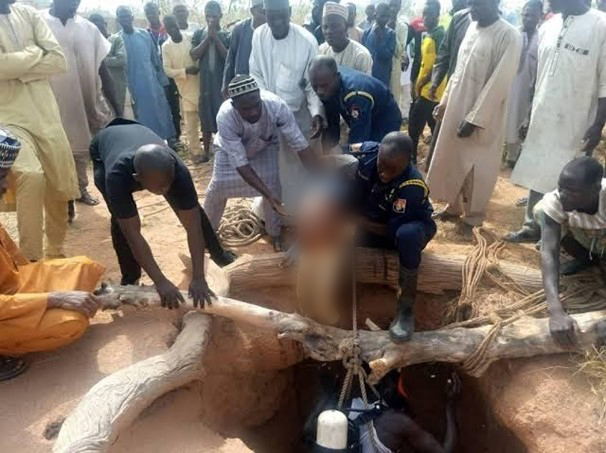Precarious Life Of Minors In Search Of Water In Open Wells In Kano

On Wednesday, 10 years old girl Binta Shehu drowned into an open well in Yanka Tsari, Dawakin Kudu Local Government Area where she had gone to fetch water for the family. She had gone out in the night on the errand, as HumAngle reported on Thursday.
Binta’s is one among numerous experiences in communities in Kano State where many homes depend on open wells for water and ask younger family members, especially children, to ensure supply.
Over a year ago, Kano State authorities thought they had found a solution to water shortage in Kano metropolis and rural areas by building an ultra-modern water treatment plant at Tamburawa town.
The project cost $58 million and produces 150 million litres of water daily to supplement the old plant in Challawa, which provides 180 million litres per day.
Currently, Kano State produces 500 million litres of water daily instead of the 700 million litres projected to be the requirement of the population of nearly 14 million, according to Kano State Water Board.
In most rural areas, there is a lack of access to potable water and the people depend on water vendors, while indigent homes depend on their underage children to water from open wells, streams and lakes.
Some children have fallen into the wells and have been rescued but others have not been lucky as was the case of Binta.
HumAngle learnt that some areas facing challenges of water scarcity are Dandago, Sheshe, Kudidufawa, Zawachiki, Danbatta, among others.
Some rural dwellers told HumAngle that the experience of households sending underage children to open wells, lakes and rivers in villages to fetch water had not often been pleasant.
Sani Aliyu Danzaki, a resident of Danzaki village, Gezawa Local Government Area, said that the lack of potable water in the community made some philanthropists in Danzaki to dig a well for public use.
“Most of the times underage children are found playing around the well, which sometimes causes undesired situations.
Most of these little children are sent by their parents. In most cases, the elderly ones refuse to fetch the water.”
At Fandanka town in Kumbotso Local Government Area, Husna Nafiu said, “I have four children and the eldest amongst them is 12 years old. We don’t have portable water in our community.
“Most of the households send their children to fetch water from the community well, we have never record incident of death but sometimes our children accidentally fall into the well because of its low height and no protection.
“We are also afraid about our children approaching the open well but we have no options, so we pray for protection and also warn them not to play around the well.”
In a telephone interview, Isa Muhammad Isa, a resident of Dawakin Kudu, said, “Dawakin Kudu is one of the rural areas facing issues of water scarcity, this makes most of us to fetch water from either the river, stream or well.
“It has been highly risky because children’s lives have been lost on various occasions in their search for water.”
Sa’idu Muhammad Ibrahim, the Spokesperson for Kano State Fire Service, said, “Parents in some rural and urban areas are in the habit of sending their underage children to open wells, which has a high risk on the lives of the children.
“We are calling the attention of parents to stop sending their little children to open wells, rivers or streams and also ensure all open wells are protected and closed with lockers.
“However, if there is need, elders should accompany the children in order to fetch water for them rather than the children fetching.”
He added: “Within this year, Kano State Fire Service has received countless calls of children drowning in a well.
“Some of the areas we received calls from are Yan katsari village in Dawakin Kudu Local Government Area, some communities from Gezawa Local Government Area, Kumbostso Local Government Area and many other common villages.
“When an incident is reported to us, we immediately respond to the situation. However, most of the residents report the incidents late after a victim has been unconscious or cannot be rescued by the community members.”
Support Our Journalism
There are millions of ordinary people affected by conflict in Africa whose stories are missing in the mainstream media. HumAngle is determined to tell those challenging and under-reported stories, hoping that the people impacted by these conflicts will find the safety and security they deserve.
To ensure that we continue to provide public service coverage, we have a small favour to ask you. We want you to be part of our journalistic endeavour by contributing a token to us.
Your donation will further promote a robust, free, and independent media.
Donate HereStay Closer To The Stories That Matter




